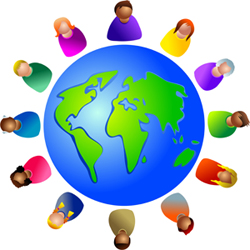A Guest Post by Kimya Dennis, Ph.D., Assistant Professor, Salem College
A recent “What Would a Feminist Do?” podcast featured Meghan Daum and Danielle Henderson. They shared their perspectives, experiences and writings regarding the childfree—people who choose not to have biological and adopted children. I found the podcast interesting and greatly appreciated it. It is common for people to say choosing not to have children is an irrelevant topic, that it is no one’s business and, therefore, it is silly to have research, internet-based articles and overall discourse on being childfree.
The Childfree & Reproductive Freedoms
However, people familiar with pronatalism (people being encouraged—sometimes forced—at practically every point in their lives to have children) know the decision not to have children is a very relevant topic. The decision not to have children is connected to many things such as what it means to be human; gender identity and sexual identity; definitions of “family”; presumed mental and physical health; morality, religiosity, and legality; and race and ethnicity.
It is important that this podcast discussed the childfree and overall reproductive freedoms. Since it was featured on “What Would a Feminist Do”, it should be noted that feminism can be widely defined and feminists do not all believe the same thing. There have always been feminists who support the decision not to have children and there have always been feminists who consider that decision to be counter to gender equality (e.g., why fight for equal pay, work-life balance for women, and equality in households if some women will not have children?). This highlights how femininity and womanhood are historically and contemporarily defined through motherhood and overall attentiveness to children, even children who are random strangers.
It must also be noted that the childfree are a population minority despite an increase in people who choose not to have children. Choosing not to have children has existed for centuries—with varying outcomes and varying consequences. There were people who considered choosing not to have children to be a justified choice that did not warrant discussion or outrage. But there were, and still are, far more people who believed choosing not to have children defied human reproduction, and especially defied femininity and womanhood.
Wearing Many Hats
I wear many hats including, in no particular order, being childfree, woman, black, black woman, feminist, black feminist, sociologist and criminologist. As I listened to the “What Would a Feminist Do” podcast I found myself responding out loud to some of the comments. I am extremely familiar with how people often respond to the childfree. There are childfree who are considered “too young” to make a permanent decision not to have children but, if they had children or aspired to have children, they would usually not be told they are too young to have children. There is also backlash for childfree people whose decision is contrary to perceived cultural identity such as religion, gender identity, and race and ethnicity.
There is nothing inherently wrong with cultural identity. However, we need to increase diversity because people within-cultures are not monolithic. We do not all think and experience the exact same things. Understanding and encouraging diversity is important because it can provide individualism and self-identity without erasing cultural identity and cultural relevance.
Cultural Identity Among the Childfree
This diversity is also why I was relieved to hear Danielle Henderson on the podcast. Among Danielle Henderson’s many accomplishments, she was one of the writers for Meghan Daum’s book Selfish, Shallow, and Self-Absorbed: Sixteen Writers on the Decision Not to Have Kids. Danielle Henderson is a black woman and a childfree black woman. This is relatively uncommon but is thankfully becoming more common. Starting in 2013, I conducted the first known study that solely consists of blacks/African Americans/people of the immediate African diaspora who have decided not to have biological or adopted children. My study has 61 respondents in 6 countries, 58 women and 3 men. It was exciting and intriguing to have so many respondents in the U.S. and in other countries. Blacks/African Americans/African diaspora are either undiscussed or under-discussed in most online childfree communities and most childfree literature.
One possible reason for non-discussion or under-discussion for some childfree communities and some childfree literature is that most readers and most contributors want “childfree unity” and to highlight commonalities. But this gets back to groups being narrowly categorized and considered monolithic. Experiences of the childfree, just as other reproductive choices, are not culturally neutral and universally applicable. Rather, all people have cultures and group identities that potentially shape personal opinions, access to resources, experiences, and life decisions. For example, blacks/African Americans/African diaspora have diverse cultures that tend to be patriarchal and pronatalist. This is led by traditionalism and conservatism regarding family, gender, sexuality, and religiosity and faith.
It is wonderful to hear the voices of various cultures among childfree people. We all need to speak and be heard.
*****
Thank you, Kimya!

Kimya N. Dennis is a sociologist and criminologist. She is Assistant Professor and the creator and Coordinator of Criminal Studies at Salem College in Winston-Salem, NC. She conducted the first known study solely of childfree people of the immediate African diaspora. She also created and teaches the first known course about the childfree. Kimya will be part of the breakfast symposium at the October 2017 The NotMom Summit.





